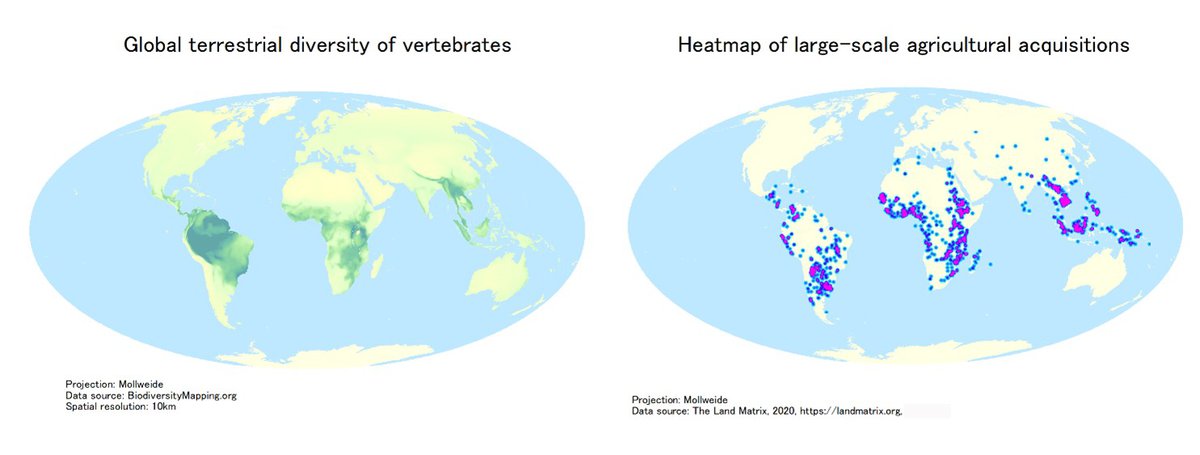Large-scale land acquisitions, agricultural trade, and zoonotic diseases: Overlooked links
Authors: Markus Giger, Sandra Eckert and Jann Lay
Published: 2021
Source: One Earth
A new commentary in One Earth highlights the link between large-scale land acquisitions (LSLAs), deforestation, and emerging zoonotic diseases. Analysing Land Matrix data from 2,485 domestic and international large-scale agricultural deals, the authors found that 87% of these occur in regions of medium-to-high terrestrial biodiversity. Many of them take place in tropical regions, where they contribute to deforestation. Alarmingly, deforestation in tropical regions is considered among the most important factors leading to the emergence of zoonotic diseases. This was highlighted recently in a report by the Intergovernmental Science-Policy Platform on Biodiversity and Ecosystem Services (IPBES,2020).[1]
A global heatmap enables comparison of investment locations with areas of high terrestrial biodiversity

Several mechanisms accompanying agricultural deals may contribute to an increased risk of zoonotic disease outbreaks. First, continued expansion of the agricultural frontier and associated loss of biodiversity could reduce the buffering effect of biodiverse ecosystem niches by decimating the variety of animals that act as buffering species, slowing or stopping pathogen transmission. Second, monocultures could modify zoonotic host diversity, increasing the share of host species. Third, implementation of LSLAs and related infrastructure in or near highly biodiverse natural habitats could increase forest fragmentation and bring more people in close contact with potential hosts of pathogens. Fourth, displacement could push people deeper into more remote areas, bringing them into contact with new reservoirs of pathogens. Fifth, conversely, risks of zoonosis might be mitigated if people’s livelihoods change in ways that reduce hazardous human-wildlife interactions, for example, by increasing people’s incomes and reducing their reliance on consumption of bushmeat.
So far, the risks of zoonotic disease emergence are seldom, if ever, factored in when assessing the benefits and costs of agricultural investments. However, initial estimates indicate that the costs of a change in policies by creating incentives that reduce deforestation and wildlife trade – and thus the risk of pandemics – could be low compared to the cost of a pandemic (Dobson et al., 2020).[2]
Nevertheless, until now, zoonosis risks have not been taken into account by any of the mainstream global guidelines on responsible agricultural investment and land governance (FAO, 2014; FAO et al., 2010).[3] Furthermore, agricultural policies should be reviewed along with LSLAs in view of preventing forest fragmentation and the further intrusion of land investments into biodiverse ecosystems.
Finally, increased transparency on land acquisitions will be instrumental in making further investigations into the implications of LSLAs in terms of emergence of zoonotic diseases possible.
Source: Commentary published in One Earth, May 2021. Giger Markus, Eckert S., Lay J. 2021. Large-scale land acquisitions, agricultural trade, and zoonotic diseases: Overlooked links. DOI: ttps://doi.org/10.1016/j.oneear.2021.04.020.
[1] IPBES. (2020). Workshop Report on Biodiversity and Pandemics of the Intergovernmental Platform on Biodiversity and Ecosystem Services. Daszak, P., Amuasi, J., das Neves, C. G., Hayman, D., Kuiken, T., Roche, B., Zambrana-Torrelio, C., Buss, P., Dundarova, H., Feferholtz, Y., Földvári, G., Igbinosa, E., Junglen, S., Liu, Q., Suzan, G., Uhart, M., Wannous, C., Woolaston, K., Mosig Reidl, P., O’Brien, K., Pascual, U., Stoett, P., Li, H., Ngo, H. T (IPBES secretariat). DOI:10.5281/zenodo.4147317.
[2] Dobson, A.P., Pimm, S.L., Hannah, L., Kaufman, L., Ahumada, J.A., Ando, A.W., Bernstein, A., Busch, J., Daszak, P., Engelmann, J., et al. (2020). Ecology and economics for pandemic prevention. Science 369, 379. 10.1126/science.abc3189.
[3] FAO. (2014). Voluntary guidelines on the responsible governance of tenure of land fisheries and forests in the context of national food security (Food and Agriculture Organization of the United Nations); FAO, IFAD, UNCTAD, and Group, T.W.B. (2010). Principles for responsible agricultural investment that respects rights, livelihoods and resources (extended version): A discussion note prepared by FAO, IFAD, UNCTAD and the World Bank Group to contribute to an ongoing global dialogue. January 25, 2010.